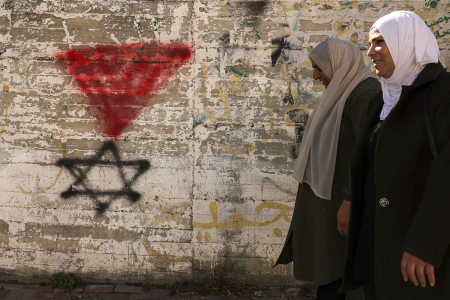Berlin bans Hamas red triangle used to target Jews, supporters of Israel

The state Senate in Berlin, Germany, has passed a motion to ban the inverted red triangle, identified as a symbol used by Hamas and their supporters to mark targets, amid escalating tensions surrounding the Israeli-Palestinian conflict. This decision comes as a response to the symbol’s increasing visibility in propaganda and public spaces, posing a direct threat to Jews and advocates for Israel’s security.
The motion states that the banned symbol, a scarlet arrow icon, has been notably used in videos and graffiti to identify enemy targets, including pro-Israel academics and politicians, according to The Telegraph.
A recent incident involved the defacement of Berlin’s Free University, where the graffiti “Kai will pay” was seen beneath the red triangle, directly targeting Berlin Mayor Kai Wegner after his decision to evict pro-Palestine protesters from the university, the British newspaper said.
The symbol has seen a resurgence in Berlin, not just at protests but also as graffiti on buildings, homes and campuses such as Humboldt University, i24 News reported. This has prompted concerns about rising antisemitism, highlighted by incidents like threatening banners at Humboldt University and similar graffiti found as far as Brooklyn, New York.
Humboldt University President Julia von Blumenthal has condemned the vandalism and threats, labeling them as “shocking antisemitism” and calling for heightened security measures.
The motion, supported by a grand coalition of the Christian Democrat, Social Democrat and the AfD, also refers to the symbol’s historical roots. The red triangle, originally used by Nazis in concentration camps to mark political prisoners, has been repurposed by Palestinian militant groups, including Hamas, to denote targets such as Israeli tanks in their propaganda efforts.
The contentious use of this symbol in Berlin, home to Europe’s largest Palestinian population, has spurred a series of pro-Palestine protests and subsequent police actions. The federal government of Germany, a staunch supporter of Israel, has also expressed its alignment with the motion, citing Israel’s security as intertwined with Germany’s state rationale.
However, opposition to the ban has surfaced, citing legal and constitutional concerns.
Green politician Vasili Franco argued that blanket bans on symbols could pose legal challenges, especially when symbols like the red triangle are used by different groups for varied purposes. For instance, the symbol is also part of the flag used by the association of victims of Nazi persecution.
Niklas Schrader, a deputy from the Left party, also warned of potential legal implications that could extend to other organizations inadvertently.
In May, The Times of Israel cited reports in German media saying that a Hamas terror cell was planning to attack the Israeli Embassy in Berlin and a U.S. military base in Germany. Authorities discovered the intended targets from data on a smartphone seized from a suspect arrested in Berlin in December. The suspect, of Lebanese origin, faced accusations from prosecutors of scouting locations to conceal weapons for the terror group. According to the report, he received directives from Hamas officials in Lebanon.
In January, reports emerged of Hamas operating a network of operatives across Europe, directed by terror leaders based in Lebanon. The network’s objective was allegedly to carry out attacks on Jewish and Israeli targets outside of Israel.






















